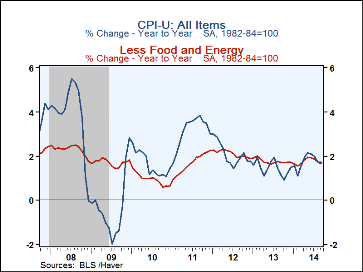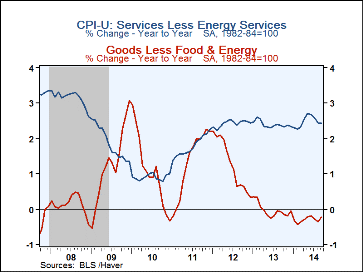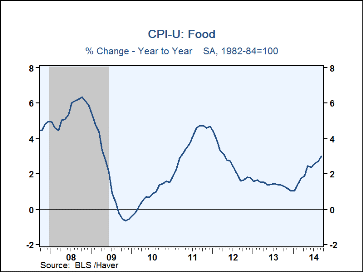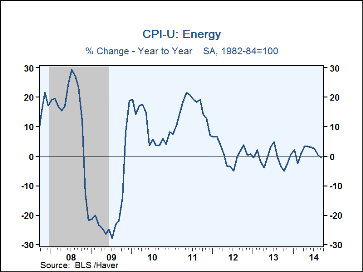 Global| Oct 22 2014
Global| Oct 22 2014U.S. Consumer Price Inflation Is Minimal
by:Tom Moeller
|in:Economy in Brief
Summary
The consumer price index gained 0.1% during September (1.7% y/y) following an unrevised 0.2% August decline. The rise matched expectations in the Action Economics Forecast Survey. Consumer prices excluding food and energy also ticked [...]
The consumer price index gained 0.1% during September (1.7% y/y) following an unrevised 0.2% August decline. The rise matched expectations in the Action Economics Forecast Survey. Consumer prices excluding food and energy also ticked 0.1% higher (1.7% y/y) following no change. Expectations had been for a 0.2% increase.
Weakness in pricing power was paced by a 0.7% decline (-0.6% y/y) in energy prices. Fuel oil prices led the way lower with a 2.1% drop (-3.2% y/y), down for the seventh straight month. Gasoline prices fell 1.0% (-3.6% y/y) on the heels of a 4.1% decline. Electricity prices were off 0.7% (+2.8% y/y) but natural gas prices rebounded 1.6% (5.8% y/y) following four straight months of decline.
Continued strength in food prices offset some of this weakness with a 0.3% increase (3.0% y/y). Meat prices remained strong, posting a 1.2% rise (13.0% y/y). Dairy product prices gained 0.5% (4.9% y/y) but egg prices declined 2.8% (+8.5% y/y). Offsetting this strength was a 0.4% decline (-0.1% y/y) in cereal & bakery product prices. Fruit & vegetable costs ticked 0.1% higher (0.9% y/y) and nonalcoholic beverage costs gained 0.2% (0.2% y/y).
Continuing weak were prices for goods less food and energy, unchanged for the month and down 0.2% y/y. Furniture & bedding prices were off another 0.7% (-3.5% y/y) but appliance costs gained 0.5% (-4.5% y/y). New vehicle prices were unchanged (0.3% y/y) but used vehicle prices slipped 0.1% (-0.4% y/y). Recreation product prices improved 0.2% (-2.2% y/y) and apparel prices were unchanged (0.5% y/y). Continuing to show strength were educational books & supplies prices which rose 0.3% (4.6% y/y).
Core service prices improved 0.2% (2.4% y/y). Shelter costs (32% of the CPI) rose 0.3% (3.0% y/y) as owners equivalent rent of primary residences increased 0.2% (2.7% y/y). Tuition & other educational costs edged 0.1% higher (3.2% y/y) while medical care services prices also gained 0.1% (1.7% y/y). Public transportation prices slipped 0.1% (-2.2% y/y) while recreation services prices were roughly stable (+1.3% y/y).
The consumer price data is available in Haver's USECON database while detailed figures can be found in CPIDATA. The expectations figure is from Action Economics and is found in the AS1REPNA database.
| Consumer Price Index (%) | Sep | Aug | Jul | Sep Y/Y | 2013 | 2012 | 2011 |
|---|---|---|---|---|---|---|---|
| Total | 0.1 | -0.2 | 0.1 | 1.7 | 1.5 | 2.1 | 3.2 |
| Total less Food & Energy | 0.1 | 0.0 | 0.1 | 1.7 | 1.8 | 2.1 | 1.7 |
| Goods less Food & Energy | 0.0 | -0.1 | -0.0 | -0.2 | -0.0 | 1.3 | 1.3 |
| Services less Energy | 0.2 | 0.0 | 0.1 | 2.4 | 2.4 | 2.4 | 1.8 |
| Food | 0.3 | 0.2 | 0.4 | 3.0 | 1.4 | 2.6 | 3.7 |
| Energy | -0.7 | -2.6 | -0.3 | -0.6 | -0.7 | 0.9 | 15.2 |
Tom Moeller
AuthorMore in Author Profile »Prior to joining Haver Analytics in 2000, Mr. Moeller worked as the Economist at Chancellor Capital Management from 1985 to 1999. There, he developed comprehensive economic forecasts and interpreted economic data for equity and fixed income portfolio managers. Also at Chancellor, Mr. Moeller worked as an equity analyst and was responsible for researching and rating companies in the economically sensitive automobile and housing industries for investment in Chancellor’s equity portfolio. Prior to joining Chancellor, Mr. Moeller was an Economist at Citibank from 1979 to 1984. He also analyzed pricing behavior in the metals industry for the Council on Wage and Price Stability in Washington, D.C. In 1999, Mr. Moeller received the award for most accurate forecast from the Forecasters' Club of New York. From 1990 to 1992 he was President of the New York Association for Business Economists. Mr. Moeller earned an M.B.A. in Finance from Fordham University, where he graduated in 1987. He holds a Bachelor of Arts in Economics from George Washington University.
More Economy in Brief
 Global| Feb 05 2026
Global| Feb 05 2026Charts of the Week: Balanced Policy, Resilient Data and AI Narratives
by:Andrew Cates










